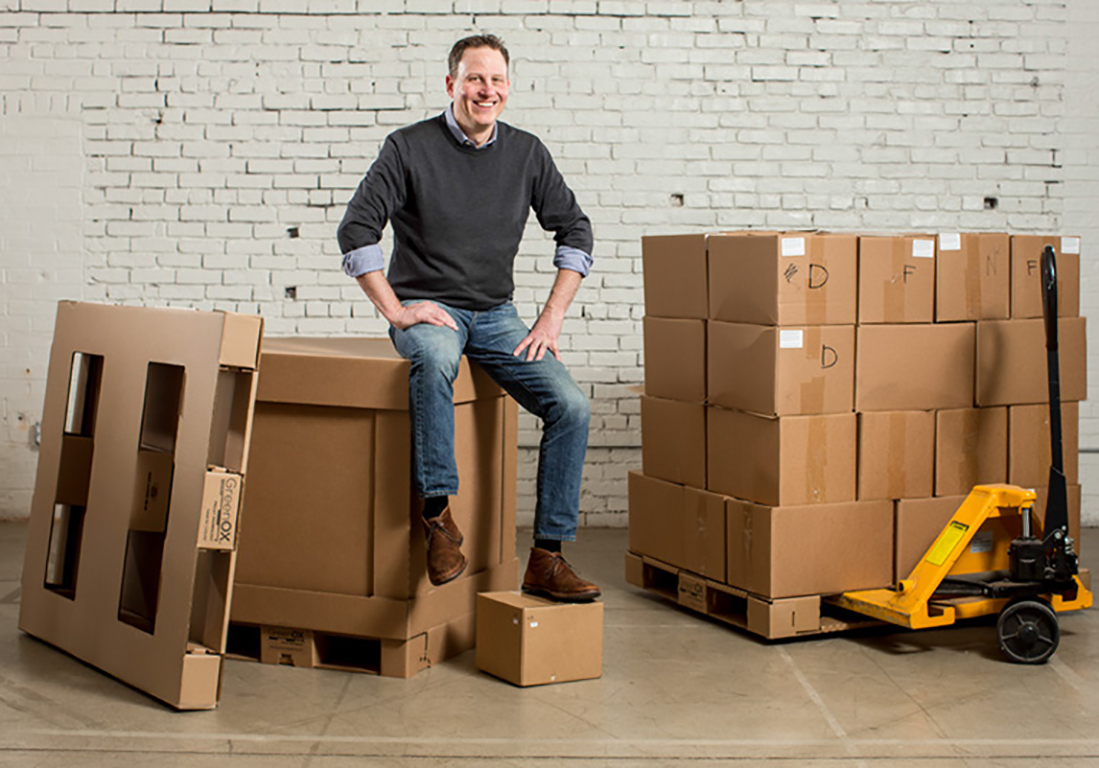Going green with cardboard pallets
13 / 12 / 2018

Environmental concerns and a drive for lower cost logistics have seen increased demand for airfreight pallets made of recyclable corrugated cardboard.
Lufthansa Cargo’s ULD management company, Jettainer, has entered into a sales partnership with German start-up trilatec for its squAIR-timber paper-based product.
The ‘paper beams’ using squAIR timber are up to 80% lighter than conventional wooden planks, without sacrificing load-bearing capacity.
One metre of the material with a net weight of only 1.2 kg carries up to five tons of cargo. Net weight of a traditionally wooden plank is 3kg-4kg per metre, said Jettainer.
In addition, squAIR-timber consists of 100% recycled material, is inexpensive and can be disposed of alongside regular paper waste without any problems.
While definitive statistics for the growing use of corrugated pallets are not available, industry feedback suggest that retailers on the shop floor are calling for greater use of sustainable pallets while shippers are equally keen to reduce shipment weight and airfreight costs.
A November 2017 research study by analysts Technavio found that the global corrugated pallets market will witness a “substantial growth rate”.
While this research covered the whole spectrum of corrugated cardboard pallets, worldwide in all modes, the adoption drivers would apply to airfreight too.
Stated Technavio: “With the recent regulations on the use of wooden pallets for preventing infestation and contamination of pallets, the demand for non-wood pallets is expected to increase.
“Corrugated pallets being lightweight, easy to recycle, and free from contamination, are a major alternative for wooden pallets, which account for around 90% of the global pallets market.
It added: “The vendors in the global corrugated pallets market will invest significantly in the development of new pallets by adopting various new technologies, such as equipment tracking and enhancing their production capacity.”
Adam Pener, president of pallet provider Green Ox in the US, says that demand for corrugated pallets is increasing, as is the number of manufacturers in this specialist market.
Says Pener: “My sense is that lightweight plastic pallets are more common, but are being phased out due to environmental and performance issues. Corrugated is the better option.”
Wood pallets require heat treatment for export, driving up the unit cost and increasing the Customs clearance time versus corrugated units.
Adds Pener: “The savings opportunity is pretty straightforward based on airfreight pricing. Operationally, we’re not seeing process change requirements with clients.”
At a time when every component of the air cargo supply chain is under intense scrutiny to be greener and less harmful to the environment, the humble pallet may escape attention, but external pressure is being applied.
Says Pener: “Adoption looks like a push from both ends. Retailers and grocers are beginning to look at “pulling” corrugated pallets for sustainability reasons.
“At the top of the chain, manufacturers want to save on airfreight. It’s easy to envision a tipping point and rapid change to corrugated for airfreight, especially if a ‘name’ company like Dell makes the switch.”
Corrugated cardboard has an image problem in logistics and there are operational concerns about using such an apparently vulnerable material, not least of which is water and prospect of a soggy pallet.
Answers Pener: “Absolutely, there are market concerns regarding robustness and water, but corrugated pallets have become commonplace enough that the market seems comfortable, especially in Europe.
“Logistics in general is messy. People tend to work through issues, especially when it comes to getting product from point A to the customer.
“Specifically regarding water, most airfreighted products can’t get wet and those that can don’t seem to be affecting corrugated performance all that much. Resistance-coating is top notch these days.”
However, one major computer retailer confirmed testing corrugated cardboard pallets “but ultimately did not pursue because the pallets did not meet our requirements around strength, resistance to moisture and customer reuse”.
Costa Rican forwarder Derco Logística Integral tested 15 pallets during a period four week period, obtaining “incredible results in terms of durability, efficiency and profitability”.
Says a spokesperson for Derco Logística: “We have used the pallets to airfreight fresh products such as pineapple, banana, roots and tubers, as well as general cargo to major world fairs with transit times of three to four days to France and China as well as Madrid and Orlando.
“In all the cases we could see that the durability and quality of the Green Ox Pallets remained intact.”
The forwarder also reports “a very positive acceptance” of the corrugated cardboard pallets as they avoid damage to the fuselage of the aircraft and other merchandise while reducing the carbon footprint.
It stated that the damage rate to the pallets during the trial was “zero”, adding that the equipment “always maintained its strength and durability in the whole process” despite the cold or frozen cool chain requirements of the fresh product shipments.
Says the spokesperson: “If we can compare the Green Ox pallet with the traditional wooden pallet, we can say that we obtained savings in transport costs.
“In addition, we saw greater efficiency and speed in the export logistics process since the weight per pallet is lower and no handling was required, such as placing corner posts to wooden pallets to protect the fuselage of aircraft and other airfreight shipments.”
Green OX pallets were successfully tested on a 350kg international airfreight shipment to China in July 2018, with a five-day transit. They have also been tested on a 21 day deepsea container sailing with a 1.2 tonne payload that experience periods of 95% humidity.
Pener says that Green Ox is engaged in an “interesting dialogue” with major airlines and airfreight 3PLs.
“I think exporters largely don’t know about the technology. 3PLs do, but they’re not able to monetise and thus aren’t wagging the dog.”














